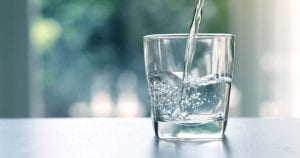
The human body is roughly 60 percent water. This vital nutrient is a building block of every cell in the body. It helps to regulate our body temperature, transport nutrients and energy through the bloodstream, flush out waste products, act as a shock absorber for our brain and spinal cord, and lubricate our joints.
To make sure our bodies have enough water to accomplish all these tasks, the average male needs to drink about three liters of water each day; the average female needs about two liters. A new observational study published in the journal eBioMedicine takes a careful look at what happens when we don’t drink enough water.
Researchers followed more 11,000 adults from 1987 to 2017. To quantify hydration levels, they measured the amount of salt in participants’ blood at regular intervals. Decreased body water is the most common reason for increased sodium concentrations. They also tracked whether participants developed chronic diseases and took a measure of biological age, which looks at DNA molecules to predict the likelihood of becoming chronically ill or dying.
In healthy adults, sodium levels in the blood range from 135 to 146 milliequivalents per liter (mEq/L). In the study, participants with levels at the higher end of that range—142 mEq/L or higher—were 10 to 15 percent more likely to have a higher biological age compared to participants with lower sodium levels. They were also 64 percent more likely to develop chronic diseases, such as heart failure, stroke, atrial fibrillation, artery disease, lung disease, diabetes, and dementia.
Participants with high levels—above 144 mEq/L—were 50 percent more likely to be biologically older and were 21 percent more likely to die earlier. The sweet spot seemed to be sodium levels between 138 and 140 mEq/L; participants routinely at this level had the lowest risk of developing chronic disease.
The study is notable because it looked at these health indicators over a long period of time. But it’s important to note that these data show a correlation, not that lower hydration levels necessarily shorten the life span or lead to disease. Still, the study provides another piece of evidence suggesting that drinking enough water daily is an important component of health.
The take-home message: When you are not optimally hydrated, you may be more likely to develop a chronic disease or die earlier.
There are some simple ways to tell if your body is optimally hydrated. For starters, take a peek at the color of your urine. If you’ve consumed enough water, it will be pale; if it is a dark yellow or amber, you need more water. Plain water is often the best thing to drink but non-caffeinated beverages like sparkling water or herbal tea are great, too. You can also try to eat foods with higher water content, such as fruits like cantaloupe and strawberries, or vegetables like lettuce, cabbage, spinach, and squash.
Happy hydrating.


